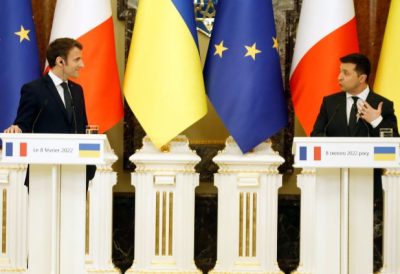West Exaggerates Russian Invasion Claim as Zelensky Loses Control of Narrative

All Global Research articles can be read in 51 languages by activating the “Translate Website” drop down menu on the top banner of our home page (Desktop version).
To receive Global Research’s Daily Newsletter (selected articles), click here.
Visit and follow us on Instagram at @globalresearch_crg.
***
On Friday February 11, perhaps one of the most ridiculous predictions made by the Western campaign to artificially manufacture a crisis in Ukraine was said by the Deputy director of the Atlantic Council’s Eurasia Center, Melinda Haring. She tweeted:
“Putin has big weekend plans in Ukraine: 1) he’s going to cut power and heat, knock out Ukrainian navy and air force, kill general staff and hit them with cyber attack; 2) then install pro-Russian president and 3) resort to full-scale military invasion if Ukraine doesn’t give in.”
Of course, the weekend passed and none of these bold predictions occurred, as was obvious. What it does demonstrate though is that Western hysteria regarding the narrative of an impending Russian invasion of Ukraine has reached unprecedented levels. Such an over exaggeration distracts from the fact that it was Kiev, and not Moscow, who abandoned the Minsk agreements.
The Minsk agreements, written in 2014 by the Trilateral Contact Group on Ukraine, consisting of the Kiev government, Russia, and the Organization for Security and Co-operation in Europe (OSCE), with mediation from France and Germany in the so-called Normandy Format, seeks to end war in the mostly Russian-speaking Donbass region of eastern Ukraine.
Ukrainian President Volodymyr Zelensky is desperate to stay in power and is afraid that a Maidan-style coup will oust him. To avoid such a situation, he abandoned the Minsk agreements to instead appease the Ukrainian military and its Far-Right militia allies by authorizing in February 2021 the mobilization of troops towards the frontier with Donbass – a fact ignored by Western leaders and commentators.
The Kremlin has repeatedly stressed that it has no intentions of invading Ukraine, but US President Joe Biden has remained unrelenting in pushing this notion. On February 13, Zelensky invited Biden to visit Kiev, saying that such a visit in the coming days would help de-escalate the situation.
Believing Biden’s visit would de-escalate the situation contradicts the American president’s actual actions to date though which are contrary to stability. For example, the Anglo Alliance (US, UK and Australia) began withdrawing diplomats from Kiev in late January, something that the Ukrainian president said “was a mistake.” This not only had a negative consequence on the Ukrainian economy, but was also followed by EU member states Belgium, Bulgaria, Cyprus, Denmark, Finland, Germany, Ireland, Latvia, Italy, the Netherlands, Spain, and Sweden urging their nationals to leave Ukraine.
Zelensky cautioned Western leaders on February 12 against stoking “panic” and a day later promised to pursue “diplomacy and deterrence” after speaking with Biden. It is in this conundrum that Zelensky finds himself in an impossible position – attempting to find a balance between the fear of an impending Russian invasion to serve Western interests and appease the Ukrainian military, and not having this fear mongering affect his country’s economy.
Having 12 of the 27 EU member states, including economic powerhouse Germany, recall their citizens from Ukraine is not conducive for trade and a stable business environment, thus making it impossible to improve Ukraine’s declining economic situation. The economic situation will only become worse as airlines now, such as KLM and SkyUp, are cancelling and/or diverting their flights to-and-from the Eastern European country.
On January 28, Zelensky said that $446 million in investments flowed out of the country due to the manufactured crisis. This number would have at least doubled since then, especially as major EU countries have called for the repatriation of their citizens and airlines are now cancelling/diverting flights from Ukraine.
However, it cannot be overlooked that it was Zelensky who began this impending Russian invasion narrative and allowed Western media and political leaders to latch onto it. The belief of an impending invasion has descended in such a way that Zelensky has now lost control of the narrative as Western leaders, media and commentators become more exaggerated in their claims, just as Melinda Haring.
It is also not lost that the US claims to have picked up intelligence that Russia has February 16 as their target date to begin their invasion of Ukraine. The official, who was not authorized to speak publicly and did so only on condition of anonymity according to AP, would not say how definitive the intelligence was. None-the-less, despite the unnamed source unwilling to reveal how definitive the intelligence was, the news circulated all across Western media, giving new headlines that the impending invasion will begin on February 16.
Reporting such news, no matter how weak the information might be, ultimately undermines the Ukrainian economy further. The AP report, which broke the news, wrote that “Zelensky has urged against panic that he fears could undermine Ukraine’s economy.” However, it is not a “fear” that an invasion narrative could undermine Ukraine’s economy, but a reality and a fact, as revealed by Zelensky himself on January 28
In this way, the vicious cycle continues. Kiev violates the Minsk agreements, which will be continually ignored by the West, but the Russian invasion story will persist despite its detriment to the Ukrainian economy and people. In this way, Ukraine has not strengthened itself despite gaining some military equipment from NATO, but rather has exposed major vulnerabilities in its economy and uncovered the true nature of alliances it thought it had with much of the West.
*
Note to readers: Please click the share buttons above or below. Follow us on Instagram, @globalresearch_crg. Forward this article to your email lists. Crosspost on your blog site, internet forums. etc.
Paul Antonopoulos is an independent geopolitical analyst.
Featured image is from InfoBrics

